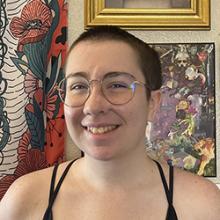Winners of 2023 Robert Foshko Memorial Scholarship & Screenplay Competition
We are thrilled to announce that the winners of the 2023 Robert Foshko Memorial Scholarship & Screenplay Competition are Sandhya R. Hermon (MFA Screenwriting '24) for her pilot “Bumbling!” and Maddalena Lupold (BS '25) for their pilot “Rin Tin Din.”
Named in honor of former UT screenwriting professor Robert Foshko, two scripts are chosen each year from our undergraduate and graduate programs. Winners receive a cash prize and their screenplays are circulated to industry professionals. UT RTF stands in solidarity with the WGA, and the winning scripts will not be distributed until the strike is resolved. UT RTF will extend the Foshko term for the 2023 winners.

In Sandhya Hermon’s fun, sharp, and laugh-out-loud pilot “Bumbling!,” an almost 40 Bay Area mom of two rebounds from her acrimonious divorce by jumping back into the dating world through the Bumble dating app.
Sandhya is a research psychologist turned screenwriter who calls California home. While she loves writing prose, she is particularly passionate about storytelling through the medium of images and cinema. Her perspectives have been shaped by her South Indian roots, her immigrant experience, her diverse work experiences (in academia and local government serving vulnerable peoples), her family including her husband and twin boys, and her love for animals and nature. Sandhya enjoys dark humor and telling stories about messy women embracing their mess while coming into their own.

In Maddalena “Maddy” Lupold’s pilot “Rin Tin Din,” when two adventurous children meet a robot who can cook but cannot taste, they team up together on culinary escapades, learning both about the true meaning of cooking and friendship. “Rin Tin Din” sweetly delivers a family show with authentic kids’ dialogue and reactions.
Maddy is a 4th year RTF student. They love kids' shows with zany comedy and effective messages. Their biggest dream is for their writing to teach kids how to be happy, healthy people. For now, Maddy works with children at Spilled Milk Social Club, and they have just as much fun learning alongside them. In their spare time, they love making textile crafts, watching bad movies, roller skating, going to concerts, and hanging out with friends. Maddy's current mission is to help kids build culinary skills early through their pilot, "Rin Tin Din," and their passion for child development.
Read our edited interviews with Hermon and Lupold below! If you’re interested in reading their screenplays, please email UT RTF Area Head for Screenwriting Maya Perez.
“I love relooking at fairy & folk tales, Hindu and Buddhist myths for stories and characters. I'm also a news junkie so that's a source of inspiration, along with my work and life experiences.”
- Hermon
When and how did you develop an interest in writing?
Sandhya Hermon: Growing up in India, I always loved my English exams that had a "composition" prompt, which was essentially a test of creative writing. I knew then that I enjoyed writing. But it hasn't been a straight path. When I first came to the US, I started working on my first (unpublished) novel. But to stay legally in the country, I had to have a work sponsor and ended up working in private industry & later, in academia. I also took a break from writing when I had kids and then before the pandemic, I started reading a lot of movie scripts and tried to write a feature script. I fell in love with the very concise form needed for screenplay writing & decided to try and make a second career out of writing for film & TV. So here I am!
Maddalena Lupold: I developed an interest in writing in high school. I started taking A/V classes and that’s where I learned how to write short stories and scripts. I ended up loving the challenge of telling a full story in such a limited capacity. When I came to UT, I took screenwriting classes that helped me hone my skills and helped me create a finished product. Those classes were the ones I enjoyed the most. I ended up falling into it, to be honest, and now it’s something I can’t live without.
What inspired you to write “Bumbling!”?
Hermon: Bumbling is a fictionalized story, loosely based on a friend's adventures in Bumble dating. There aren't very many stories about women trying to reclaim their sexuality in their 40s and I really wanted to write about a woman in a messy situation trying to find sexual joy while trying to juggle motherhood, a career, and a bitter divorce.
What inspired you to write "Rin Tin Din"?
Lupold: I don’t know how to cook or eat healthy. My household didn’t teach me the skills required for cooking, so there’s been quite a learning curve figuring out how to feed myself in a way that isn’t fast food burgers. And as I tried to decipher recipes online and learn how to cook myself, I realized that there aren’t many cooking shows for kids. Sure, there are a few YouTube videos here and there, but cooking shows are mainly targeted at adults; or have chefs who are further along on their cooking journey than a novice like me or a kid who doesn’t know where to start. Showing kids how to make themselves meals, while also building up children’s confidence in trying new foods and learning a life skill everyone needs is important. It’s an important part of society that entertainment has left fairly untouched, and kids should be taught early. I want to give children the agency to cook and know how to feed themselves, and I wanted to write a show that I would enjoy learning from as a kid or right now.
How do you go about developing your characters and finding your characters’ voices?
Hermon: I think my background in psychology helps when I do character development. In particular, I've found attachment theory to have a lot of predictive power when it comes to adult relationships & behavior. So I try to think about my characters' childhoods & growing up influences while developing their outlook & voices.
Lupold: I bounced a lot of ideas off of my friends and my partner, who helped me come up with world-building, recipes, and character ideas. In making a pitch deck for the show, I ended up drawing out some of my characters. I’m no Da Vinci, but seeing the characters in my head on paper gave them personalities that I could translate into my stories. In terms of finding the voices for my younger characters, I tried avoiding current popular phrases and focused on things I would say as a kid—what things I liked, how I reacted to certain things, etc. I also work with children, and the way they communicate inspires me. As I write more episodes, I want to bring on an intersectional variety of cultural influences to incorporate memories, phrases, mannerisms, etc. into the voices of the characters and the food. For now, I draw from my memories and my imagination.
You are in the Master in Fine Arts program in Screenwriting in the Radio-Television-Film Department at The University of Texas at Austin. What has your experience been like?
Herman: Overall it's been good. Having to juggle work, family, and school has been overwhelming at times but I'm really glad I'm able to have this experience. It's allowed me to carve out time for my writing, and treat it as more than a side hobby. I have valued the collaborative nature of the program, and the notes from great professors and fellow writers. Also, the deadlines are hugely helpful in the production of work.
You are an undergraduate student in the Radio-Television-Film Department at The University of Texas at Austin. What has your experience been like?
Lupold: I love writing here at UT. Having a dedicated class space to write and bounce ideas off of people and fine-tuning my skills has been invaluable. It’s been my favorite part of UT so far! It’s helped me discover what I want to do with my career and gave me the confidence to pursue it. My writing only gets better because of the many talented peers who have helped me tighten my scripts. The deadlines and feedback on my writing also helped me accomplish more, so the structure of screenwriting classes really helped me polish my products. It’s helped me find lifelong friends and collaborative partners. I can’t wait to see where else I go with my writing.
What are your career goals?
Hermon: Ideally, after my MFA, I'd like to work successfully as a full-time writer for film and TV.
Lupold: I would love to be in a writer’s room someday. I’d also love to work in production design, specifically for props and costumes. Collecting eclectic knick-knacks and making props/clothing has become a passion of mine to pursue. It’s my favorite aspect of production, so working on a set under the props and costume department would be a dream. For now, however, I’m enjoying my current work in childcare. It’s really helped me learn a lot about how children function and how to communicate effectively, so it’s been a blast finding a passion for that. I have a lot of avenues I’d like to explore, so here's hoping I explore them all!
“I want to write unique content that feels special to me and serves a purpose. I find more inspiration from things that I want to see or what would have made me happy as a kid. I want to help people grow, laugh, and be happy through my work.”
- Lupold

